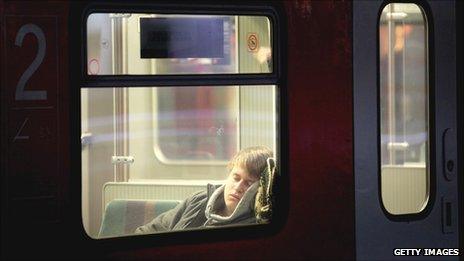Is interrailing still a rite of passage?
- Published
- comments

Interrailing around Europe was once many a teenager's first taste of international adventure, but in the era of global backpacking is it still an institution, asks Miranda Sawyer.
It was 1985 when I first went interrailing. I was 18 years old, chubby, chatty and utterly disorganised.
I had my backpack - it was as large as I was, stuffed full of tent, towel, gas cooker and enough clothes to give Top Shop a run for its money - and there were 200 pounds-worth of travellers cheques in my nylon money belt.
But, in terms of actually knowing what I was doing, let's just say that I ran out of money after 12 days and had to live on green peppers salvaged from the pavements near markets. And accommodation? I became very familiar with my backpack, as I used it so often as a pillow, on station floors in France, in a park in Switzerland, and outside a shop in Italy.
The second time I went interrailing, in 1991, I was cannier. I slept on the trains, rather than at the stations. I got further - through Austria and into post-communist Czechoslovakia. When I returned home, I felt… not sophisticated, but experienced.
Interrailing taught me resourcefulness, a sense of humour and how to sleep in a luggage rack. It showed me a world outside Britain that was both familiar and strange. It gave me freedom like I'd never experienced before. It was great.
The interrail pass was launched in 1972 as Europe-wide train ticket for young people - then under 21 - costing just £27.50 and covering 21 countries, from Ireland to Yugoslavia.
It was an instant success - just a year after it arrived, 85,000 young Europeans, most of them British, used it to take to the railways. By the time I went interrailing, in the mid-80s, the age limit had been raised to 26, and well over 250,000 passes were being issued every year.
But does anyone go interrailing now? Aren't young people more adventurous, travelling to the Far East and India for gap years?
Aren't they more savvy, using cheap flights to get to Ibiza or Ayia Napa for a fortnight of partying? I've just taken a five-day tour that included Paris, Venice and Prague, and I met interrailers wherever I went.
Most travelled in groups, and many were British. Though they looked as daft as I did when I first went interrailing - enormous rucksacks, silly hair - they were much more organised than I had been, sorting out accommodation before they went, hoping to keep to an impressive, some might even say unrealistic, itinerary.
Aaron, who I met as he was setting off on his travels, told me he was planning to visit "Brussels, Amsterdam, Berlin, Munich, Venice, Florence, Rome, Milan, Monte Carlo, Nice, Paris". He was interrailing for just two weeks.
The internet means that modern interrailers can use websites to reserve where they're going to stay. The good places are booked up months in advance.
As a hostel newbie - the ones on offer when I was young being more akin to borstals than anything else - I was astonished to discover they now have free wifi, a bar, barbecues, beer nights, and rooms more akin to boutique hotels than the dirty, ram-a-jam hell-holes of my youth. I could have wept.
Does that make the modern backpacker a bit soft? Forced to be organised, there's no sleeping in stations for them. Another difference is money. No-one has travellers' cheques any more - they have bank cards that work in most cash machines across Europe.
In Venice, the British pro-consul assures me that interrailing had changed. There is much less theft on trains, and, even if you are robbed, you can be wired money that will arrive in less than two hours. Backpackers, no matter how scruffy, are less likely run out of cash.
So much of my young interrailing experience had been devoted to finding somewhere to sleep, to faffing about changing money, to working out just how little I could exist on a day. What was interrailing about, if not such minor escapades?
All the interrailers I met had been changed by their adventures. I met a group in Venice who had visited Auschwitz, another crew that had been running with the bulls in Pamplona, a lad who'd been arrested in Prague. All these experiences were specific to their travels, to arriving somewhere and just happening upon whatever's going on.
The essence of an interrailer is constant, Matthias Schwender, who runs an independent hostel in Prague, said to me.
"Someone who is independent-minded, that can connect to other people, that is culturally aware, wants to learn about new cultures and cities, they want to know where the locals go. They know the value of taking some time off in your life for travelling."
Another interrailer, Titi, argued that you learn about Europe's tumultuous history by being there, understanding what happened, rather than reading about it in books.
Though they were definitely less naive and more organised than I was, and certainly better-washed, today's interrailers didn't seem quite so different from chubby, cheerful me, all those years ago.